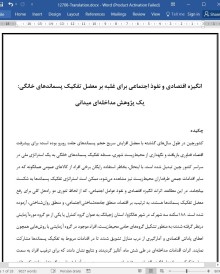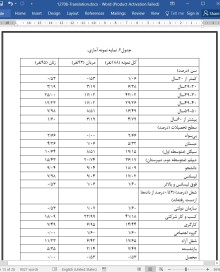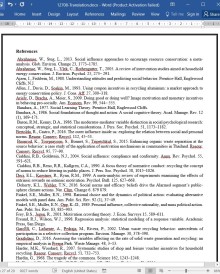
دانلود مقاله انگیزه اقتصادی و نفوذ اجتماعی برای غلبه بر معضل تفکیک پسماندهای خانگی
چکیده
کشور چین در طول سال های گذشته با معضل افزایش سریع حجم پسماندهای جامد روبرو بوده است؛ برای پیشرفت اقتصاد فناوری بازیافت و نگهداری از محیط زیست شهری، مسئله تفکیک پسماندهای خانگی به یک استراتژی ملی در سراسر کشور چین تبدیل شده است. با اینحال، بخاطر استفاده رایگان برخی افراد از کالاهای عمومی همانگونه که در سایر اقدامات جمعی طرفداران محیط زیست نیز مشاهده می شود، ممکن است استراتژی تفکیک پسماندها به شکست بیانجامد. در این مطالعه، اثرات انگیزه اقتصادی و نفوذ عوامل اجتماعی، که از لحاظ تئوری دو راه حل کلی برای رفع معضل تفکیک پسماندها هستند، به ترتیب، بر اقتصاد، منطق جامعه شناختی/اجتماعی، و منطق روان شناختی، آزموده شده است. 188سکنه سه شهرک در شهر هانگژوا، استان ژجیانگ به عنوان گروه کنترل یا یکی از دو گروه موردآزمایش درنظر گرفته شدند؛ به منظور تشکیل گروه های حامی محیط زیست، افراد موجود در گروه آزمایشی با روش هایی همچون اعطای پاداش اقتصادی و آمارگیری از درب منازل تشویق شدند تا در اقدامات مربوط به تفکیک پسماندها مشارکت نمایند. اثرات اقدامات مداخله ای در طی شش ماه، آنالیز گردیدند و نتایج نشان دادند که برای ترغیب افراد به سمت عمل تفکیک پسماندها، انگیزه اقتصادی، مؤثرتر از بسیج عموم مردم بود. آزمایش های دیگر نشان دادند که مؤلفه خودکارآمدی، تاحدودی عامل میانجی و مؤثر بر این دو استراتژی است؛ در حالیکه مؤلفه هنجارهای شخصی (بجای مؤلفه نشان دادن رفتار) ارتباط مثبتی با این دو استراتژی داشت. علاوه براین، اثرات تعدیل-کنندگی چند متغیر آماری-اجتماعی بر مکانیسم های روان شناختی نیز مورد بررسی قرار گرفتند. در بخش نتیجه-گیری، در مورد یافته ها، محدودیت ها و پیشنهادات لازم برای تحقیقات آتی، و خط مشی های این مطالعه، بحث می شود.
1. مقدمه
مدیریت پسماندهای جامد خانگی در سراسر جهان به عنوان یک شاخص کلیدی برای سنجش کیفیت زندگی شهرنشینان و میزان پاکیزگی محیط شهری پذیرفته می شود. اخیراً کشور چین با افزایش سرسام آور 10-8 درصدی تولید پسماندهای خانگی در هر سال روبرو شده است؛ این مقدار، زنگ خطری جدی برای سلامت محیط زیست و استانداردهای زندگی شهروندان است. ازآنجاکه، یکی از استراتژی های اصلی در بسیاری از کشورها، ترویج رفتار تفکیک پسماندهای خانگی برای افزایش میزان بازیافت و کمتر شدن میزان دفن و سوزاندن پسماندها می باشد (استووا و آلریکسون، 2017) بنابراین تفکیک پسماندهای خانگی به یکی از مهمترین موضوعات دستورکار دولت چین تبدیل شده است. بطور ویژه، مجلس کشور چین در تاریخ مارس 2017 بیانیه ای عملی برای سیستم تفکیک پسماندهای خانگی صادر کرده است که این اتفاق، فوریت و اهمیت این امر را می رساند.
بدون شک، مشارکت گسترده عموم مردم در طرح تفکیک زباله، کلید موفقیت این طرح است زیرا موفقیت در این طرح، نیازمند تلاش هماهنگ تمام اعضای جامعه می باشد. با اینحال، همچون سایر رفتارهای جامعه گرایی، این اقدام جمعی نیز دربرابر استفاده رایگان برخی افراد از کالاهای عمومی، آسیب پذیر است (اوسلان، 1965) و به راحتی به شکست می انجامد. ازآنجاییکه تفکیک زباله، کمک به پاکیزگی محیط زیست و استفاده بهینه تر از منابع انرژی است بنابراین جزء اقدامات داوطلبانه خدمات اجتماعی محسوب می شود (یائو، 2010)، با اینحال ممکن است منافع جمعی و بلندمدت این کار نتواند جبران کننده زمان، انرژی و/یا سایر هزینه های پرداخت شده توسط هر فرد برای تفکیک درست زباله باشد (گارسز و همکاران، 2002). علاوه براین، این هزینه ها باید بصورت مشترک و تمام افراد پرداخت شوند نه اینکه کسی از پرداخت آنها معاف گردد (یائو، 2010). از این رو، عقلانیت حکم می کند ساکنانی که به دنبال بیشترین منفعت و بهره برداری از تفکیک زباله هستند بخواهند جدای از دیگران دست به اقدام بزنند و مشارکت گروهی را انتخاب نکنند.
5.4. محدودیتهای این پژوهش و دستورالعملهای لازم برای تحقیقات آتی
یکی از محدودیتهای اصلی این مطالعه، گزارش میزان تفکیک زباله توسط خود افراد است (خودگزارش دهی) و چون می تواند بخاطر تفاوت بین عملکرد مطلوب اجتماعی و عملکرد واقعی آن موجب خطای اندازه گیری شود که این خود، مشکل آفرین است. از این رو، پژوهش آتی می تواند با بهره مندی از داده های مشاهده ای این مطالعه، از مزایای تکرار این مطالعه استفاده کند. ثانیاً، ما فقط اثرات جزئی و کوتاه مدت رویکردهای اقتصادی و اجتماعی را رصد کردیم و دانش اندکی از میزان ماندگاری این اثرات در بلندمدت داریم. بنابراین، توصیه می شود که برای پرده برداشتن از اثرات پویای این روش های مداخله ای حتماً آزمایشات بلندمدت تر یا نظرسنجی های ردیابی/پیگیری انجام گردد. ثالثاً، برای کاوش درباره نفوذهای خارجی، دو مؤلفه میانجی بالقوه (خودکارآمدی و هنجارهای شخصی) را مورد بررسی قرار دادیم که می تواند به تشریح ارتباط قوی تر بین تحقیقات مداخله ای و تحقیقات تعیین کننده در حوزه تفکیک و بازیافت زباله های خانگی کمک کند. با اینحال، هنوز عوامل اصلی بسیاری مانند هویت، ارزش درک شده کالاهای عمومی، و درک افراد از موفقیت گروهی، در این زمینه مطرح هستند و گفته می شود بخش های اساسی برای پیش بینی مشارکت افراد در اقدامات گروهی و رفتار آنها دربرابر محیط زیست می باشند (آبراهامز و استگ، 2013؛ فینکل و همکاران، 1989؛ واروتو و اسپاگنولی، 2017). بنابراین، برای توضیح دادن درباره چگونگی طراحی مداخلات مؤثر به منظور دستیابی به اقدامات جمعی موفق در حوزه تفکیک زباله های خانگی سایر اقدامات محافظتی از محیط زیست، باید در تحقیقات آتی بحث بیشتری در مورد این عوامل صورت گیرد و چارچوبی سیستماتیکی برای آنها طراحی شود.
Abstract
China has experienced a rapid growth of solid waste over the years, household waste source-separation is becoming a nationwide strategy for promoting recycling economy and improving urban environmental sustainability. Waste separation, however, may end in failure due to the free-rider problem similarly existing in other pro-environmental collective actions. Along with the economic and sociological/social psychological logic respectively, this study tested the effects of economic incentive and social influence, which are theoretically considered as two general solutions to domestic waste separation dilemma. One hundred and eighty-eight residents in the three communities of Hangzhou, Zhejiang Province were assigned to a control group or one of two experimental scenarios, where they were encouraged to participate in waste separation activities through either the economic rewards given on their performance, or door-stepping campaigns aimed at constructing a supportive social environment. Six-month intervention effects were analyzed and showed that economic inducement was more effective than social mobilization in promoting waste separation. Further mediation tests indicated that self-efficacy partially mediated the effects of both strategies, while personal norms were positively associated with two treatments instead of behavior demonstration. In addition, the moderating effects of several socio-demographic factors on psychological mechanisms were also explored. The findings, limitations and implications for future research and policy are discussed in the concluding section.
1. Introduction
Household solid waste management is widely accepted as a key indicator in measuring both the quality of life of dwellers and urban sustainability. China has recently experienced a dramatic increase in domestic waste production at the rate of 8%-10% per year1 – approaching an alarming level that poses a severe threat to the environment and citizens’ living standards. As one of the major strategies adopted in many countries, promoting source-separation of household waste to increase recycling and lighten the load of landfill and incineration (Stoeva and Alriksson, 2017), has become one of the most pressing issues on Chinese government agenda. In particular, the State Council has issued its Implementation Program of Household Garbage System in March 2017, highlighting the urgency and importance of this work.
Undoubtedly, the widespread participation of general public is the key to the success of waste separation in a society, since it requires a concerted effort of social members. Like other prosocial behaviors, however, such collective action is vulnerable to the free-rider problem (Olson, 1965) and easily ends in failure. By its nature, waste separation is a voluntary provision of such public goods as a cleaner environment and more efficient utilization of energy resources (Yau, 2010), yet these longer-term and collective benefits may not cover the time, energy and/or other costs paid by individuals for accurately separating (GarcÉS et al., 2002). Moreover, they need to be supplied jointly but not excludable to anyone (Yau, 2010). Driven by rationality, hence, residents seeking utility maximization tend to free ride on others’ efforts and choose not to engage in waste separation.
5.4. Limitations and future directions
One of the main limitations is the self-reported measure for individual waste separation, which is problematic since it may lead to the measurement error resulting from the socially desirable responding in comparison with actual behavior. Hence, future research might benefit from replicating our study by virtue of observational data. Secondly, we only observed the relatively short-term effects of economic and social approaches, with little being known about their durability over a long-term time-span. Therefore, it is recommended that longitudinal experiments or tracking surveys are needed for uncovering the dynamic evolution of these intervention effects. Thirdly, self-efficacy and personal norms were examined as two potential mediators for exploring the mechanisms of outer influences, which can help delineate a stronger link between intervention-based and determinant-based research within the domain of household waste separation and recycling. However, there are still many underlying factors such as identity, perceived values of public goods, and perception of group success that are suggested as essential parts in predicting individual participation in collective actions and pro environmental behavior (e.g., Abrahamse and Steg, 2013; Finkel et al., 1989; Varotto and Spagnolli, 2017). Therefore, these factors need to be further discussed by future studies to construct a systematical framework, for explaining how effective interventions should be designed to achieve successful collective actions within the realm of household waste separation and other environment protection actions.
چکیده
1. مقدمه
2. دو راهکار برای حل معضل تفکیک زباله
2.1. انگیزه اقتصادی
2.2. نفوذ اجتماعی
2.3. خلاصه تحقیق و پیش بینیها
3. روشها
3.1. شیوههای تفکیک زباله در شهر هانگزو
3.2. رویکرد
3.3. اندازه گیری ها
4. نتایج
4.1. آمارهای توصیفی
4.2. آنالیز استراتژی
4.3. بررسی اثر میانجی گرهای این فرایند (خودکارآمدی و هنجارهای شخصی)
4.4. بررسی اثرات تعدیل کنندگی مؤلفه عادت به تفکیک زباله و متغیرهای آماری-اجتماعی
5. بحث و نتیجه گیری
5.1. تأثیرات کلی دو طرح ابتکاری
5.2. مکانیسمهای روانشناختی مداخلات خارجی
5.3. جلوه های متمایز رفتار تفکیک زباله برای هر مخاطب ویژه
5.4. محدودیتهای این پژوهش و دستورالعملهای لازم برای تحقیقات آتی
منابع
Abstract
1. Introduction
2. Two solutions to waste separation dilemma
2.1. Economic incentive
2.2. Social influence
2.3. Summary and predictions
3. Methods
3.1. Separation practices in Hangzhou
3.2. Procedure
3.2. Procedure
4. Results
4.1. Descriptive statistics
4.2. Analytical strategy
4.3. Examining the mediating effects of self-efficacy and personal norms
4.4. Examining the moderating effects of separation habit and sociodemographic factors
5. Discussion and conclusions
5.1. Overall effects of two initiatives
5.2. Psychological mechanisms of external interventions
5.3. Differentiated effects for specific audiences
5.4. Limitations and future directions
References
- اصل مقاله انگلیسی با فرمت ورد (word) با قابلیت ویرایش
- ترجمه فارسی مقاله با فرمت ورد (word) با قابلیت ویرایش، بدون آرم سایت ای ترجمه
- ترجمه فارسی مقاله با فرمت pdf، بدون آرم سایت ای ترجمه



